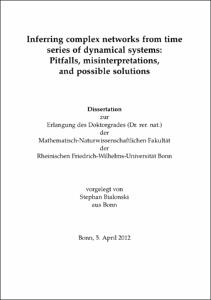Inferring complex networks from time series of dynamical systems: Pitfalls, misinterpretations, and possible solutions

Inferring complex networks from time series of dynamical systems: Pitfalls, misinterpretations, and possible solutions

| dc.contributor.advisor | Lehnertz, Klaus | |
| dc.contributor.author | Bialonski, Stephan | |
| dc.date.accessioned | 2020-04-18T00:01:43Z | |
| dc.date.available | 2020-04-18T00:01:43Z | |
| dc.date.issued | 26.07.2012 | |
| dc.identifier.uri | https://hdl.handle.net/20.500.11811/5350 | |
| dc.description.abstract | Understanding the dynamics of spatially extended systems represents a challenge in diverse scientific disciplines, ranging from physics and mathematics to the earth and climate sciences or the neurosciences. This challenge has stimulated the development of sophisticated data analysis approaches adopting concepts from network theory: systems are considered to be composed of subsystems (nodes) which interact with each other (represented by edges). In many studies, such complex networks of interactions have been derived from empirical time series for various spatially extended systems and have been repeatedly reported to possess the same, possibly desirable, properties (e.g. small-world characteristics and assortativity). In this thesis we study whether and how interaction networks are influenced by the analysis methodology, i.e. by the way how empirical data is acquired (the spatial and temporal sampling of the dynamics) and how nodes and edges are derived from multivariate time series. Our modeling and numerical studies are complemented by field data analyses of brain activities that unfold on various spatial and temporal scales. We demonstrate that indications of small-world characteristics and assortativity can already be expected due solely to the analysis methodology, irrespective of the actual interaction structure of the system. We develop and discuss strategies to distinguish the properties of interaction networks related to the dynamics from those spuriously induced by the analysis methodology. We show how these strategies can help to avoid misinterpretations when investigating the dynamics of spatially extended systems. | en |
| dc.language.iso | eng | |
| dc.rights | In Copyright | |
| dc.rights.uri | http://rightsstatements.org/vocab/InC/1.0/ | |
| dc.subject | Komplexes System | |
| dc.subject | Graph | |
| dc.subject | Multivariate Daten | |
| dc.subject | Zeitreihenanalyse | |
| dc.subject | Abtastung | |
| dc.subject | Medizinische Physik | |
| dc.subject | Hirnforschung | |
| dc.subject | Epilepsie | |
| dc.subject.ddc | 530 Physik | |
| dc.subject.ddc | 610 Medizin, Gesundheit | |
| dc.title | Inferring complex networks from time series of dynamical systems: Pitfalls, misinterpretations, and possible solutions | |
| dc.type | Dissertation oder Habilitation | |
| dc.publisher.name | Universitäts- und Landesbibliothek Bonn | |
| dc.publisher.location | Bonn | |
| dc.rights.accessRights | openAccess | |
| dc.identifier.urn | https://nbn-resolving.org/urn:nbn:de:hbz:5n-29272 | |
| ulbbn.pubtype | Erstveröffentlichung | |
| ulbbnediss.affiliation.name | Rheinische Friedrich-Wilhelms-Universität Bonn | |
| ulbbnediss.affiliation.location | Bonn | |
| ulbbnediss.thesis.level | Dissertation | |
| ulbbnediss.dissID | 2927 | |
| ulbbnediss.date.accepted | 13.07.2012 | |
| ulbbnediss.fakultaet | Mathematisch-Naturwissenschaftliche Fakultät | |
| dc.contributor.coReferee | Hammer, Hans-Werner |
Dateien zu dieser Ressource
Das Dokument erscheint in:
-
E-Dissertationen (4397)




